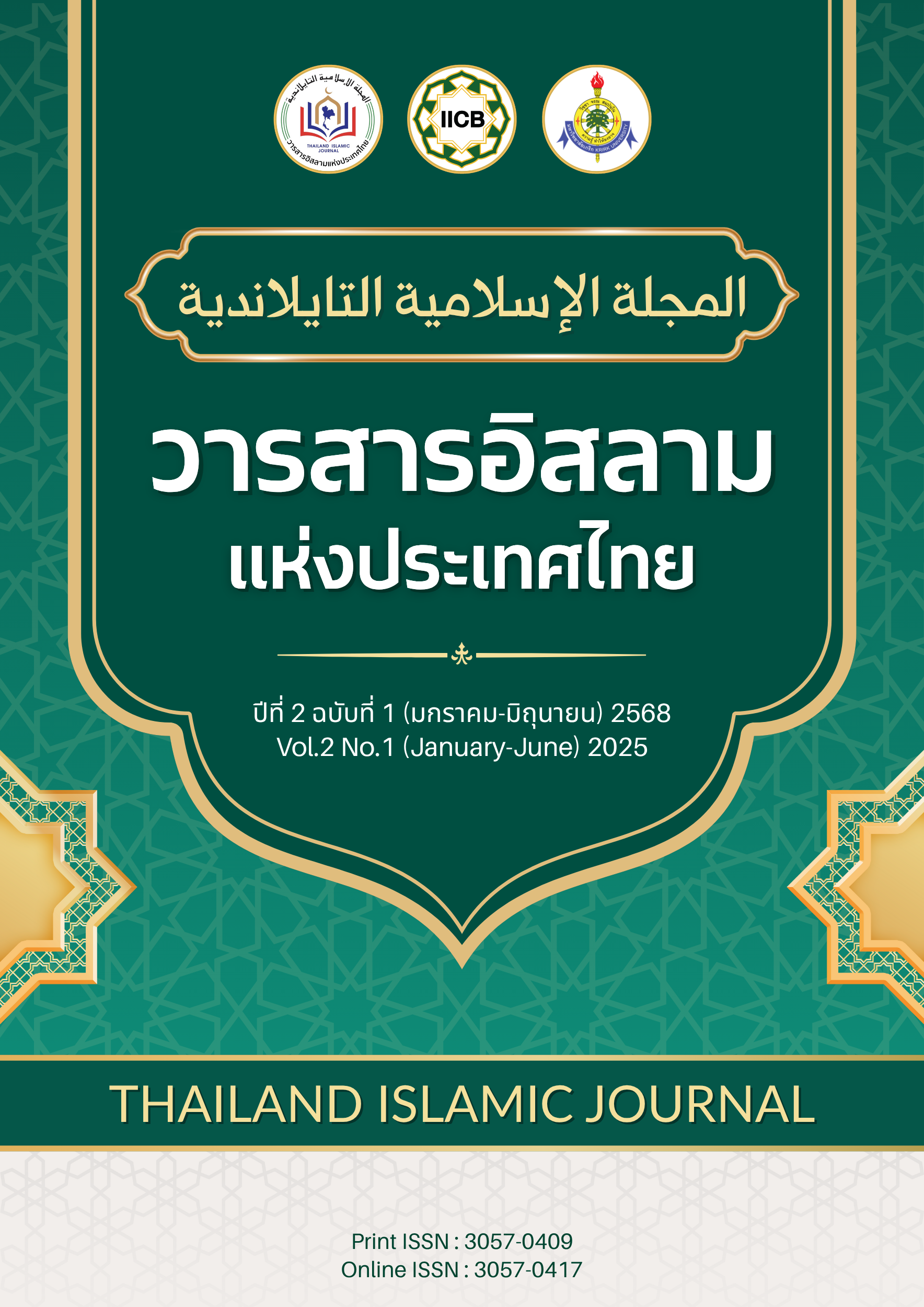A Model for Promoting Muslim-Friendly Tourism in Thailand
Keywords:
Muslim-friendly tourism, Tourism Promotion, HALAL ModelAbstract
Abstract
Muslim-friendly tourism has emerged as a rapidly growing trend in the global tourism industry, particularly in Thailand, which possesses significant potential to attract Muslim tourists from around the world. This academic article analyzes the trends, potential, and challenges associated with the development of Muslim-friendly tourism in Thailand. Using a literature review methodology, the study synthesizes credible academic sources to propose strategic approaches for promoting this emerging tourism segment. The findings introduce the HALAL Model, an integrated conceptual framework comprising five key components: H – Hospitality, emphasizing respectful and culturally sensitive service; A – Accessibility, ensuring the provision of religious facilities such as prayer rooms and Qibla indicators; L – Lifestyle Compatibility, promoting tourism activities aligned with Islamic principles; A – Authentic Halal Food, advocating internationally certified halal food standards; and L – Learning and Communication, fostering intercultural understanding through education and effective communication.This model serves as a strategic tool to guide policy-making and service development that effectively address the unique needs of Muslim tourists, while positioning Thailand as a leading regional hub for Muslim-friendly tourism in Asia customers.
References
บรรณานุกรม
Abdrakhmanova, S., & Moghavvemi, S. (2022). Muslim friendly services in Muslim and non-Muslim destinations: Benchmarking. International Journal of Tourism, Culture and Spirituality, 5(2), 1-15. https://doi.org/10.33258/ijotcs.v5i2.793
Abror, A., Patrisia, D., Trinanda, O., Omar, M. W., & Wardi, Y. (2021). Antecedents of word of mouth in Muslim-friendly tourism marketing: The role of religiosity. Journal of Islamic Marketing, 12(4), 882-899. https://doi.org/10.1108/JIMA-04-2019-0078
Aziz, A. H. B. A. (2018). Muslim friendly tourism: Concept, practices and challenges in Malaysia. International Journal of Academic Research in Business and Social Sciences, 8(11), 355–363. https://doi.org/10.6007/IJARBSS/v8-i11/4891
Battour, M., & Ismail, M. N. (2016). Halal tourism: Concepts, practices, challenges and future. Tourism Management Perspectives, 19, 150-154. https://doi.org/10.1016/j.tmp.2015.12.008
Billee, A., Duangsaeng, V., Trakarnsiriwanich, K., & Chaoprayoon, P. (2019). Muslim tourists’ expectations toward Halal tourism in Songkhla Province, Thailand. Asian Administration & Management Review, 2(2), 11-20. https://so01.tci-thaijo.org/index.php/AAMR/article/view/241088
Cetin, G., & Dincer, M. Z. (2016). Muslim friendly tourism (MFT): A discussion. Journal of Tourismology, 2(1), 65-67. https://doi.org/10.26953/jourt.2016.2.1.25
Chookaew, S., Chanin, O., Charatarawat, J., Sriprasert, P., & Nimpaya, S. (2015). Increasing halal tourism potential at Andaman Gulf in Thailand for Muslim country. Journal of Economics, Business and Management, 3(7), 739-741. https://doi.org/10.7763/JOEBM.2015.V3.277
El-Gohary, H. (2016). Halal tourism, is it really Halal? Tourism Management Perspectives, 19, 124-130. https://doi.org/10.1016/j.tmp.2015.12.013
Henderson, J. C. (2016). Halal food, certification and halal tourism: Insights from Malaysia and Singapore. Tourism Management Perspectives, 19, 160-164. https://doi.org/10.1016/j.tmp.2015.12.003
Islamic Tourism Centre. (2022). Malaysia: The global leader in Muslim-friendly tourism. https://itc.gov.my/
Jafari, J., & Scott, N. (2014). Muslim world and its tourisms. Annals of Tourism Research, 44, 1–19. https://doi.org/10.1016/j.annals.2013.08.011
Madlaeh, N., & Chalermmuang, G. (2024). A survey of Muslim tourists' satisfaction with tourism services in Thailand. Journal of Islamic Studies, Prince of Songkla University, 15(1), 23-38. https://so03.tci-thaijo.org/index.php/JOIS/article/view/264627
Mastercard & CrescentRating. (2023). Global Muslim Travel Index 2023. CrescentRating. https://www.crescentrating.com/reports/global-muslim-travel-index-2023.html
Ministry of Tourism and Creative Economy. (2021). Indonesia’s Halal tourism development roadmap. Kemenparekraf.
Muslim, A. K., & Harun, A. (2022). Exploring the concept of Muslim friendly tourism. International Journal of Religious Tourism and Pilgrimage, 10(3), Article 6. https://doi.org/10.21427/8p0a-ax79
Pew Research Center. (2017, April 5). The changing global religious landscape. https://www.pewresearch.org/religion/2017/04/05/the-changing-global-religious-landscape/
Razzaq, S., Hall, C. M., & Prayag, G. (2016). The capacity of New Zealand to accommodate the halal tourism market—Or not. Tourism Management Perspectives, 18, 92–97. https://doi.org/10.1016/j.tmp.2016.05.009
Said, M. F., Adham, K. A., Muhamad, N. S. A., & Sulaiman, S. (2022). Exploring halal tourism in Muslim-minority countries: Muslim travellers’ needs and concerns. Journal of Islamic Marketing, 13(4), 824-842. https://doi.org/10.1108/JIMA-04-2020-0112
Samori, Z., Salleh, N. Z. M., & Khalid, M. M. (2016). Current trends on halal tourism: Cases on selected Asian countries. Tourism Management Perspectives, 19, 131–136. https://doi.org/10.1016/j.tmp.2015.12.002
Shnyrkova, A., & Predvoditeleva, M. (2022). The needs of Muslim hotel customers: Evidence from Russian guests. Journal of Islamic Marketing, 13(1), 133-160. https://doi.org/10.1108/JIMA-09-2020-0294
Sulaiman, Z. A., Iranmanesh, M., Foroughi, B., & Rosly, O. (2022). The impacts of Shariah-compliant hotel attributes on Muslim travellers revisit intention: Religiosity as a moderator. Journal of Islamic Marketing, 13(10), 2108-2125. https://doi.org/10.1108/JIMA-10-2020-0311
Tourism Authority of Thailand. (2021). Halal tourism in Southern Thailand. https://www.tourismthailand.org
World Tourism Organization. (2024). UNWTO world tourism barometer, 22(1). https://doi.org/10.18111/wtobarometereng
Downloads
Published
How to Cite
Issue
Section
License
Copyright (c) 2025 Internatinal Islamic College Bangkok, Krirk University

This work is licensed under a Creative Commons Attribution-NonCommercial-NoDerivatives 4.0 International License.
วารสารที่ได้รับการตีพิมพ์เป็นลิขสิทธ์ของวิทยาลัยนานาชาติอิสลามกรุงเทพ มหาวิทยาลัยเกริก
ข้อความที่ปรากฎในบทความแต่ละเรื่องในวารสารวิชาการเล่มนี้เป็นความคิดเห็นส่วนตัวของผู้เขียนแต่ละท่านไม่เกี่ยวข้องกับวิทยาลัยนานาชาติอิสลามกรุงเทพ และคณาจารย์ท่านอื่น แต่อย่างใด ความรับผิดชอบองค์ประกอบทั้งหมดของบทความแต่ละเรื่องเป็นของผู้เขียน




